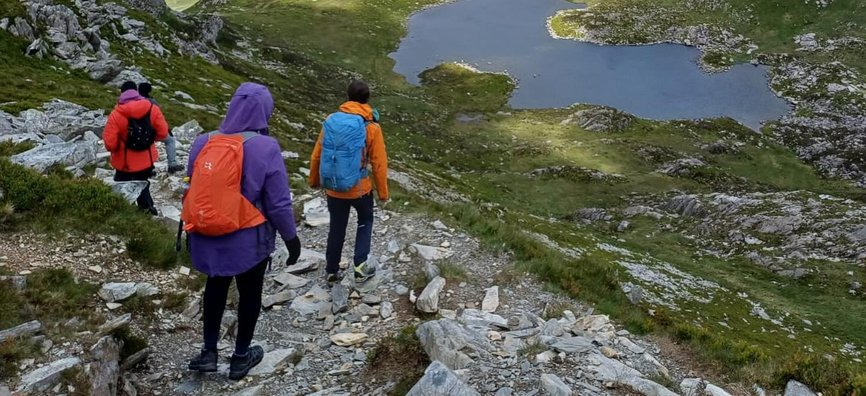Defra, the Environment Agency, and Esmée Fairbairn Foundation, with the support of Triodos Bank UK, have formed a collaboration to support environmental projects to attract private sector or other investment to help tackle climate change and restore nature.
Four projects which will protect and restore valuable habitats have been selected to receive grant funding in a pilot scheme to encourage sustainable private sector investment in our natural environment.
Pilot scheme projects
- The four projects receiving funding
- Devon Wildlife Trust’s restoration of the Caen wetlands
- The Rivers Trust’s work on natural flood management in the Wyre catchment in Lancashire
- NFU’s work to reduce nitrate pollution in Poole Harbour
- Moors for the Future Partnership’s restoration and conservation of peatlands in the Pennines.
You can learn more about each of these further below.
- How will it work
Having been sourced and evaluated by Triodos Bank UK the projects will receive grant funding from Defra, the Environment Agency and Esmée Fairbairn Foundation to support their development, complete business plans to attract private sector investment, and deliver long-term environmental benefits and sustainable financial returns.
Caroline Mason, Chief Executive of Esmée Fairbairn Foundation, said:
We need bold action and impact like never before when it comes to protecting our natural world. If the current climate crisis is to be successfully reversed, more money will be crucial. With these grants we hope to explore both the potential and the limits for generating revenue to deliver environmental outcomes. If we understand the models that can make money and can be funded through private capital, we can raise additional money for nature and make sure that public and philanthropic funding goes where it’s most needed.
About the projects
- Restoration of the River Caen wetlands
Sitting on the northern bank of the River Caen, the Caen Wetlands project is a bold and innovative proposal to create a stunning habitat and visitor resource in northern Devon. The wetlands site is one of the UK’s most important sites for wetland birds but is under pressure from human impacts, climate change, and rising sea levels.
Devon Wildlife Trust has recently completed on the purchase of its 57th Nature Reserve – Horsey Island. Located in the heart of the North Devon UNESCO Biosphere Reserve, Horsey Island is a wildlife rich area of intertidal wetland habitats extending to over 80 hectares. Horsey borders the tidal reaches of the River Caen which flows through Braunton and out into the Taw Estuary.
Alongside the restoration of the habitat, the development of the site for ecotourism through a visitor centre and other facilities will provide a source of income, with the seed funding being used by Devon Wildlife Trust to develop a business case for investment in this project.
- Natural Flood Management in the River Wyre catchment
The use of natural flood management, including the building of leaky dams, the creation of bog, and the rewetting of peat, on 70 hectares of the River Wyre catchment by the Rivers Trust would help to reduce the frequency of flooding for a number of properties in Lancashire.
At the same time as reducing flood risk, these natural flood management schemes will create new habitats for wildlife and help to mitigate climate change through the storage of greenhouse gases in the newly created wetlands and peatlands.
The seed funding will allow The Rivers Trust to work with the Wyre Rivers Trust, Environment Agency, United Utilities, Triodos Bank UK, Co-op Insurance and Flood Re, to develop a financial instrument that would allow upfront investment from the private sector to be reimbursed by the beneficiaries of a healthier environment.
- Poole Harbour Nutrient Management Scheme
One of the largest natural harbours in the world, Poole Harbour in Dorset is of international importance to wildlife, being home to a vast range of aquatic life and wetland birds, including egrets, ringed plovers, and grebe.
However, as a habitat for wildlife, it is now under pressure, with nutrients such as nitrate from agriculture in its catchment flowing down into the harbour and leading to a rapid growth of algae which smothers the estuarine habitat and reduces the amount of food available for birds.
Through the Poole Harbour Nutrient Management Scheme, the National Farmers Union is aiming to work with and support the farmer-led collaboration in the catchment, equipping them with tools to reduce their use of nitrates.
The proposed innovative, industry-led model is designed to offer both environmental benefits and productivity gains for farming businesses. The local community, water companies and local government will all see benefits from the improved water quality.
- Peatland restoration in the Pennines
Peatlands have a vital part to play in tackling climate change, storing more carbon than all other types of vegetation in the world combined, and damage to peatlands is a major source of carbon emissions.
The peatlands of the south and west Pennines are some of the most degraded in uplands in Europe, and as well as being damaged in the past by the coal-fired industry in Manchester and Sheffield, they are facing future pressure from hot summers and wet winters due to climate change.
The Moors for the Future Partnership is already working to restore and conserve peatland in the area, but needs to attract greater investment in order to carry out this work on a larger scales to protect more of this vital habitat.
It is hoped this project will be successful in developing a range of returns, including financial, for investors.




